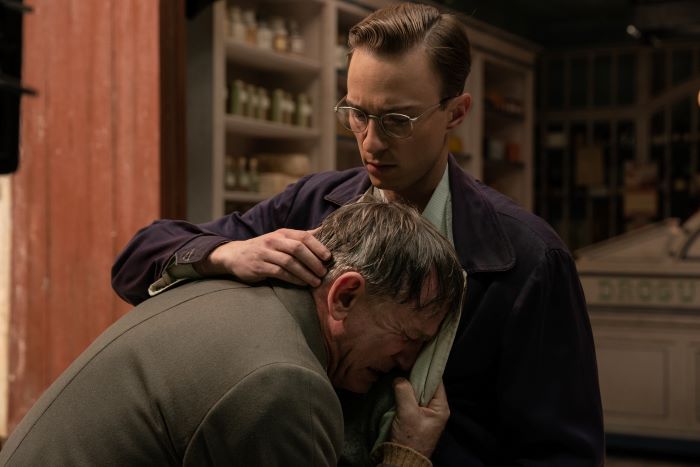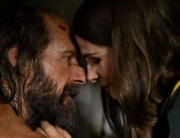Luca Guadagnino has proven himself to be a director who transforms the work of others while simultaneously freeing himself from its shadow (as seen in Suspiria) and making it seem as if it was meant to become a film. (Call Me by Your Name and Bones and All were both based on novels.) That’s why a book as difficult and controversial as William S. Burroughs’s Queer could not have found a better-suited artist for its conversion into a vital and frenzied cinematic work. The film had its U.S. premiere in the Spotlight Gala selection at the 62nd New York Film Festival.
Written in the 1950s but only published in 1985, Burroughs’s novel is a provocative semi-autobiographical text, an exemplary portrait of his personal experience as a homosexual and drug addict, with frank depictions of gay sexuality. The film faithfully follows the book’s premise about the life of an American expatriate living in Mexico during the 1940s. There, he indulges freely in his two favorite vices: drug use and promiscuous sex (with young men). Readers of the book, familiar with Burroughs’s biography, will enjoy catching references, but even those encountering the material for the first time will still experience it as a beguiling tale.
The rawness and vulgarity of Burroughs’s prose wouldn’t align today with the demands for a “positive” representation. Guadagnino, along with screenwriter Justin Kuritzkes (following their first collaboration, Challengers), takes on the difficult task of capturing part of the shameless and uncomfortable spirit that distinguished Burroughs and his work. This is not exactly easy in a time when the word “queer” has been destigmatized as a slur and carries a celebratory connotation. Two creative decisions help: casting Daniel Craig as the protagonist of a romantic and erotic gay odyssey (an actor contemporary audiences may still associate with James Bond) and doubling down on the book’s hallucinatory aspects with exuberant body horror. The adventures of William Lee (Craig), the fictionalized avatar of Burroughs in the novel, transform into a thrilling explorations of desire and its painful impossibilities.
In the best performance of his career so far, Craig plays Lee with cynicism and frantic desperation, always teetering between an endless hangover and the next dive into nights of remorseless excess. Sayombhu Mukdeeprom’s cinematography creates a sweaty and intoxicating atmosphere, filled with beauty that exists somewhere between order and the wilderness, where everyone is left to fend for themselves with no consequences. The only caution Lee takes is avoiding emotional involvement with the young men he picks up in bars. An encounter with a crooked-toothed hustler (played by singer Omar Apollo) underscores how Lee is only after physical satisfaction. In contrast, his friend Joe (Jason Schwartzman) is perpetually obsessed and let down by whichever young lover has dumped him. Both define themselves as queers, speculating about other potential members of their tribe in a milieu where everyone seems open to a fling, regardless of how they identify.
Lee’s peace is entirely disrupted when he meets Eugene Allerton (Drew Starkey), a discharged soldier with the delicate grace and looks of a prince. They first exchange glances to the tune of Nirvana’s “Come as You Are” (and this won’t be the only anachronistic selection in the soundtrack). Lee manages to have a few friendly outings with the reserved young man, initially approaching him awkwardly with a soliloquy about being queer, directly taken from the novel. Craig infuses the words with anxiety and pathos. At first, he resists making any inappropriate moves. During their meetings, his imagination splits body and spirit—his ghostly double daring to touch and caress the object of his desire while the men share a drink or watch a movie together (Jean Cocteau’s Orpheus, a crucial reference that anticipates the dreamlike trajectory the film will take). Eventually, the awaited opportunity for physical consummation arises, but this remains mostly a story of unrequited love, or at least not entirely reciprocated.
Once again, Guadagnino complicates the intersection of carnal desire and romantic longing with images loaded with an eroticism that is both sublime and deeply physical. There aren’t as many sex scenes as one might expect, but they are not downplayed by a coy pan to a window. Guadagnino makes a visual joke, perhaps responding to some critiques of Call Me by Your Name for not being more sexually daring, when the camera pans to the window but then returns to the naked lovers in the throes of passion. Cum-filled kisses and Lee and Eugene’s shared hallucination of their skins merging as one are among the most beautiful and stimulating visual representations in the director’s filmography, reaching their peak of madness and chaos in a third act centered around a trip to the South American jungle. There, Lee searches for a natural drug said to grant telepathic powers. Lee’s newest obsession, despite his addiction problems, isn’t for the ultimate trip. Rather, he wants to fully connect with a loved one who is becoming increasingly unreachable, even when standing right next to him. Eugene accompanies him on the journey under an agreement: Lee will take care of everything in exchange for moments of kindness and intimacy.
Perhaps in the future, we will look back on Guadagnino’s varied filmography and recognize this particular film as the centerpiece that gives meaning to his body of work. Queer is a gorgeously filmed nightmare where opening one’s mind and vomiting one’s heart (another unforgettable visual motif) can’t change someone else’s will or invoke their unspoken feelings. A mystical epilogue focuses on unanswered questions, suggesting that dissolving and looking away might be the most redemptive alternative for Lee. But sometimes you’ve already seen and felt too much, leaving only time and its reward of loneliness to soothe the yearning. Desire can become the most damning addiction, and there’s no rehab for that.







Leave A Comment